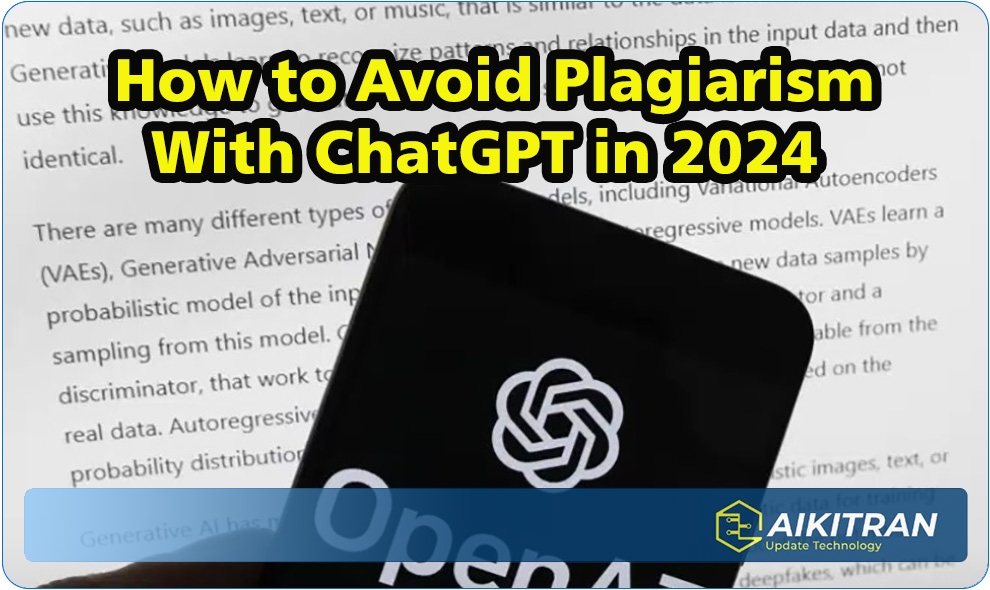How to Avoid Plagiarism With ChatGPT
How to Avoid Plagiarism: Plagiarism can have serious repercussions, from academic penalties and reputational harm to potential legal actions against the perpetrator.
There are multiple strategies you can employ to avoid plagiarism with chat gpt, such as properly attributing sources and conducting research; personalizing writing with personal insights and infusing it with individuality – these will all help ensure your writing meets ethical standards and remains original.

Paraphrasing
As an AI language model, ChatGPT generates text based on patterns and information found within vast amounts of data. While ChatGPT contains safeguards against plagiaristic content creation, users must understand its limitations before employing this tool responsibly.
While ChatGPT doesn’t facilitate direct essay plagiarization, it may still be used to steal ideas and information without giving credit to their original source. This form of intellectual theft can be far more serious than straight word-for-word copying because it fails to give recognition of original authors. Plagiarism is considered a serious offense under most academic and professional codes of conduct and may result in severe punishments for those engaging in it.
Plagiarism can be an issue when using AI to write essays or papers. To reduce its likelihood, consider paraphrasing responses provided by AI while adding personal experiences and thoughts of your own into your essay to create more authentic work. Furthermore, run it through a plagiarism checker just to be safe!
ChatGPT can also be utilized for various tasks beyond essay writing, including translating texts between languages, summarizing text into paragraphs, and finishing incomplete sentences. Furthermore, its domain-specific capabilities make it useful when used for legal documents or medical records – although ChatGPT should never replace human writers; rather it serves as a useful research and brainstorming tool.
Plagiarism is an offense and should never be committed, which is why taking time to evaluate and edit AI-generated content to ensure it does not contain plagiarized text is essential. Furthermore, using proper attribution when citing AI-generated content will protect you from getting in trouble for plagiarism while attributing your work appropriately – following these tips can reduce the risk of plagiarism when using ChatGPT for essay or paper writing.
You must read… GPT ENGINEER – A POWERFUL CODING ASSISTANT 2024
Citing
Plagiarism can take many forms and consequences. Plagiarism is an issue with serious repercussions for academic institutions as well as professional businesses alike, including academic sanctions and potential career damage. Some forms of plagiarism include copying text verbatim without giving credit, paraphrasing without giving due credit, and failing to acknowledge sources in works cited without providing proper citation or giving proper credit – these forms alone don’t represent all forms of plagiarism either directly or indirectly; there may also be indirect forms such as citing existing sources without giving the proper credit.
Citing your sources when writing for ChatGPT is essential to avoid being accused of plagiarism. A citation generator like QuillBot will assist in creating accurate citations. Furthermore, an online plagiarism checker such as PlagScan allows you to ensure your work is free from plagiarized material and accurate.
ChatGPT is an artificial intelligence (AI) software designed to generate responses for specific user requests or inquiries. The language and tone can be tailored according to user preference; however, errors may still arise so it is wise to review and edit content prior to publishing it.
How you interpret ChatGPT responses depends entirely on their creators’ intentions. In general, ChatGPT should not be used to commit direct plagiarism; its primary function is providing additional information or suggestions that enhance writing quality; not replacing an editor as such.
While using AI writing tools can be helpful, it’s also important to draw upon other sources for information in order to avoid plagiarism and enhance the overall quality of your writing. These may include academic articles, industry experts and data-driven studies as these sources add depth and breadth to your content.
Another effective strategy for avoiding plagiarism when writing with ChatGPT is incorporating your personal experiences and insights into your work, as this will give your piece a distinct touch that sets it apart from its competition while helping prevent unintended plagiarism.

Editing
One of the more frequently asked questions about Chat GPT is whether it is possible to plagiarize text generated using it. Plagiarism involves copying or paraphrasing another person’s work without giving proper credit and can have serious repercussions both academically and professionally. Plagiarizing can result in academic sanctions, loss of reputation and legal action being taken against those found engaging in it, so it is crucial to be aware of its various forms and how best to avoid plagiarism when using an AI writing tool such as Chat GPT.
For you to avoid plagiarism when using Chat GPT, it is crucial that you paraphrase and cite your sources. This will ensure your content is original while giving credit where applicable. Furthermore, using a plagiarism checker will help ensure your text does not contain any duplicated material; saving both time and effort when writing.
Chat GPT is a machine learning program, not capable of producing entirely original text. Instead, its responses rely on patterns and information learned from existing text data – so it is up to you as the reader to critically assess and edit Chat GPT results to ensure they accurately reflect your ideas and perspectives. Furthermore, some academic institutions may impose specific guidelines regarding machine-generated content in written assignments.
Many individuals worry that by using Chat GPT to write their papers they may be accused of plagiarism. This should not necessarily be the case as long as you take steps to cite sources and avoid direct quotations; any major plagiarism-checking service will probably not consider your paper plagiarized if written properly; nonetheless it would still be wise to double-check for any potential plagiarism issues before submitting to any service.
As an alternative, a free online plagiarism checker is an ideal way to inspect your paper for potential plagiarization. It will show a list of similar content and highlight sections which are most likely to be flagged, helping you spot plagiarized passages before submitting your paper for review.
Infusing Personal Insights
ChatGPT is an innovative writing aid that creates human-like text responses to given prompts using its proprietary linguistic knowledge to produce personalized and relevant text responses. However, ChatGPT may use information from external sources and cite them accordingly; this may pose issues in academic environments and thus users should ensure they adhere to any guidelines provided by scholarly organizations or educational institutions when using this tool.
ChatGPT may produce text similar to existing essays on the American Civil War due to being trained on large volumes of existing text data. You should review and edit its output so it reflects your personal ideas and viewpoints; additionally, be sure to cite and attribute its content accordingly and confirm whether it complies with academic standards.
By adding personal insights to your work, incorporating personal observations can help prevent plagiarism with chat gpt and other AI writing tools. Doing this will prevent it from sounding robotic or impersonal while simultaneously increasing accuracy and credibility of the information provided to readers by including multiple sources – academic articles, industry experts and data-driven studies for example – into it to form an engaging narrative with lasting value for readers.
Plagiarism is a serious threat that can result in academic and professional failure. To effectively combat plagiarism, the best strategy is using reliable plagiarism-checking software while staying informed on current research on your topic. Furthermore, you should cite and credit sources when applicable as well as revise and edit work to get feedback from human editors before final submission of work to AI ethics committees for consideration.
Overall, ChatGPT should not be seen as plagiarism; however, its responsible use must adhere to academic institutions and scholarly associations guidelines. By properly citing your sources and carefully evaluating output before keeping informed on latest AI ethics developments you can utilize this tool without jeopardizing your academic integrity.